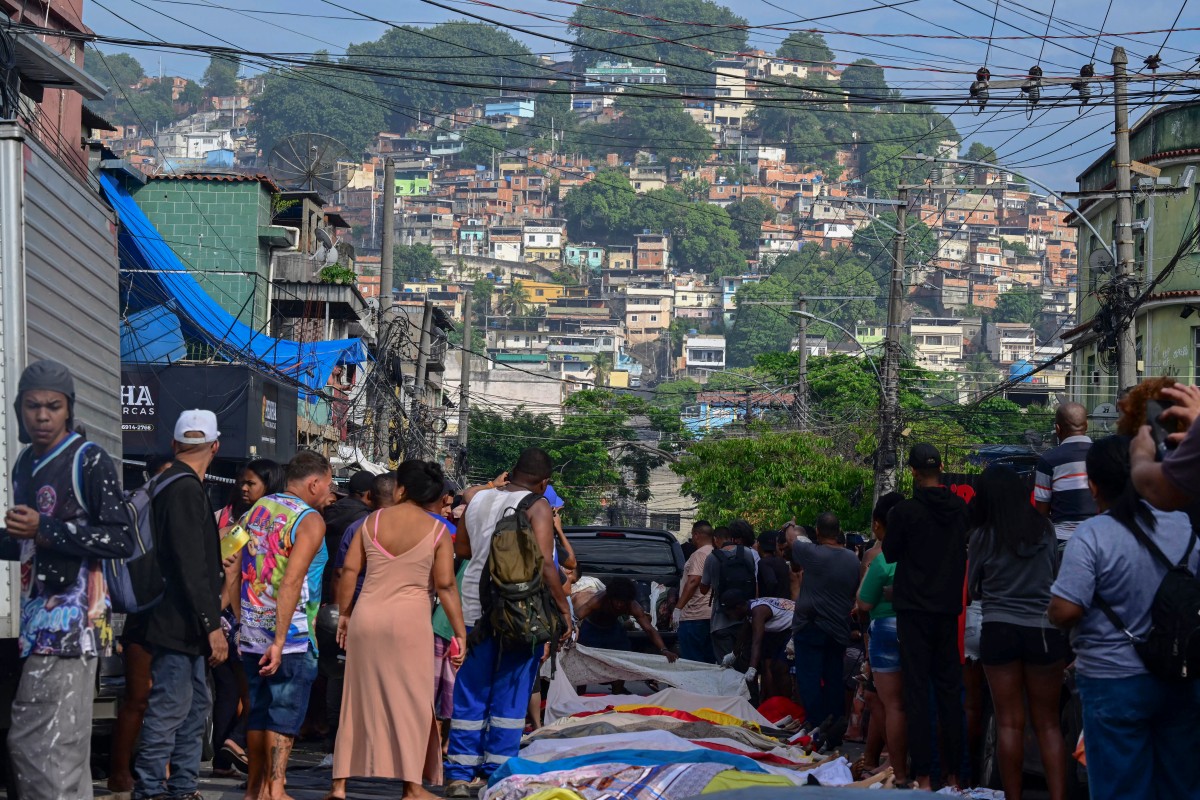Organizations alert UN and OAS to ‘deliberate strategy of armed confrontation’ in Rio de Janeiro
Institutions call for an independent international investigation into Operation Containment, which left more than 120 dead and exposed the pattern of racial violence in Rio de Janeiro’s favelas
 Bodies are seen lined up on Sao Lucas Square of the Vila Cruzeiro favela at the Penha complex in Rio de Janeiro, Brazil, on October 29, 2025, in the aftermath of Operacao Contencao (Operation Containment). Residents of a favela in Rio de Janeiro lined up more than 40 bodies at a plaza in their low-income neighborhood on Ocotber 29, a day after the bloodiest police operation in the city's history, AFP reported. (Photo by Pablo PORCIUNCULA / AFP)
Bodies are seen lined up on Sao Lucas Square of the Vila Cruzeiro favela at the Penha complex in Rio de Janeiro, Brazil, on October 29, 2025, in the aftermath of Operacao Contencao (Operation Containment). Residents of a favela in Rio de Janeiro lined up more than 40 bodies at a plaza in their low-income neighborhood on Ocotber 29, a day after the bloodiest police operation in the city's history, AFP reported. (Photo by Pablo PORCIUNCULA / AFP)
Human Rights organizations appealed on Wednesday (29) to the United Nations (UN) and the Organization of American States (OAS) for immediate action in response to the grave violations committed during Operation Containment, launched on October 28 in the Penha and Alemão favela complexes in Rio de Janeiro (RJ). The action, which left more than 120 people dead, is considered the most lethal police operation in the state’s history and was marked by summary executions, disappearances, and attacks on residents.
The appeal was sent to UN and OAS mechanisms responsible for monitoring human rights violations, including the UN International Independent Expert Mechanism to Advance Racial Justice and Equality in the context of Law Enforcement (EMLER), the UN Working Group of Experts on People of African Descent, and the mandates of Special Rapporteurs on Racism, Extrajudicial Executions, and Human Rights Defenders. The document was also sent to commissioners and rapporteurs of the Inter-American Commission on Human Rights (IACHR), including those on Defenders and Justice Operators, Memory, Truth and Justice, and the Rights of Afro-descendant People.
The request was submitted by Conectas Human Rights, Instituto Pro Bono, Center for Studies on Security and Citizenship (CESeC), Justiça Global, Rede Liberdade, Redes da Maré, Institute for the Study of Religion (ISER), Criola, Arns Commission, and the Center for Justice and International Law (CEJIL). The organizations call for the operation to be recognized as a grave human rights violation and urge the urgent creation of an independent international commission for verification and forensic investigation.
Read more
Reports of executions and intimidation of residents
According to the complaint, the operation began in the early morning hours with gunfire, the closure of schools and shops, and the suspension of public transport. Residents reported home invasions, beatings, shots fired from helicopters and drones, and obstruction of medical assistance to the wounded.
The following morning, dozens of bodies were found by families and residents in the forested area between the Penha and Alemão complexes — many with gunshots to the back of the head, tied hands, and signs of torture. Despite this, the police failed to secure the area for forensic examination and began investigating the residents who removed the bodies, accusing them of “procedural fraud.”
Pattern of violence and structural racism
The document emphasizes that the episode reveals a systematic pattern of racial and territorial violence already denounced by international bodies. Brazil has been condemned twice by the Inter-American Court of Human Rights — for the Acari (1990) and Nova Brasília (1994 and 1995) massacres — and continues to fail in its obligation to ensure independent investigations.
The organizations also cite the UN Expert Mechanism’s report on Racial Justice, which described the Brazilian context as a form of “ethno-racial cleansing,” due to the disproportionate use of force and the criminalization of Black and marginalized populations.
Request for urgent measures
The appeal calls on the UN and IACHR to adopt urgent measures, including:
-
Recognition of Operation Containment as a grave human rights violation;
-
Creation of an independent international commission to monitor forensic work and investigations;
-
Protection for families, residents, and human rights defenders under threat; and
-
Strengthening of mechanisms for police oversight and accountability.
For the organizations, “Operation Containment represents a context of summary executions carried out by the State itself, reinforcing a deliberate policy of extermination in working-class and predominantly Black territories.”






